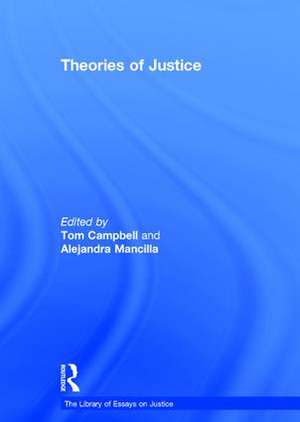Theories of Justice: The Library of Essays on Justice
Autor Alejandra Mancilla Editat de Tom Campbellen Limba Engleză Hardback – 28 apr 2012
Preț: 1588.99 lei
Preț vechi: 2130.44 lei
-25% Nou
Puncte Express: 2383
Preț estimativ în valută:
304.06€ • 318.26$ • 253.07£
304.06€ • 318.26$ • 253.07£
Comandă specială
Livrare economică 10-24 martie
Doresc să fiu notificat când acest titlu va fi disponibil:
Se trimite...
Preluare comenzi: 021 569.72.76
Specificații
ISBN-13: 9780754629726
ISBN-10: 0754629724
Pagini: 634
Ilustrații: includes 24 previously published journal articles
Dimensiuni: 174 x 246 x 45 mm
Greutate: 1.43 kg
Ediția:New.
Editura: Taylor & Francis
Colecția Routledge
Seria The Library of Essays on Justice
Locul publicării:Oxford, United Kingdom
ISBN-10: 0754629724
Pagini: 634
Ilustrații: includes 24 previously published journal articles
Dimensiuni: 174 x 246 x 45 mm
Greutate: 1.43 kg
Ediția:New.
Editura: Taylor & Francis
Colecția Routledge
Seria The Library of Essays on Justice
Locul publicării:Oxford, United Kingdom
Cuprins
Contents: Introduction; Part I Theorizing Justice: Two ways to think about justice, David Miller; What do we want from a theory of justice?, Amartya Sen; The structure of justification in political constructivism, Michael Buckley. Part II Justice as Equality: Equality and equality of opportunity for welfare, Richard J. Arneson; On the currency of egalitarian justice, G.A. Cohen; What is the point of equality? Elizabeth S. Anderson; Equality of whom? Social groups and judgments of injustice, Iris Marion Young. Part III The Scope of Justice: Where the action is: on the site of distributive justice, G.A. Cohen; Institutions and the demands of justice, Liam B. Murphy; On the site of distributive justice: reflections on Cohen and Murphy, Thomas W. Pogge. Part IV Left-Libertarianism: Liberty and equality, Hillel Steiner; Left-libertarianism, a review essay, Barbara H. Fried; Why left-libertarianism is not incoherent, indeterminate or irrelevant: a reply to Fried, Peter Vallentyne, Hillel Steiner and Michael Otsuka. Part V Justice as Desert: Distributive justice and desert, Alistair M. MacLeod; Justice and desert in liberal theory, Samuel Scheffler; On the comparative element of justice, Owen McLeod; Equality and desert, Shelly Kagan. Part VI Feminists and Other Critics: Humanity before justice, T.D. Campbell; Justice and gender, Susan Moller Okin; The challenge of care to idealizing theories of distributive justice, Anca Gheaus; Liberal and socialist egalitarianism, Kai Nielsen. Part VII Ideal and Non-Ideal Justice: Justice in ideal theory: a refutation, Colin Farrelly; 'Ideal theory' as ideology, Charles W. Mills; What's ideal about ideal theory?, Zofia Stemplowska; Name index.
Notă biografică
Tom Campbell, Professor, CAPPE, Charles Sturt University, Australia and Alejandra Mancilla, CAPPE, Australian National University, Australia
Descriere
This volume of essays provides a general overview of the main strands in contemporary justice theorising and features the most important and influential theories of justice from the 'post Rawlsian' era. Also included is the critique of the Rawlsian paradigm, especially from feminist perspectives and from the growing strand of 'non-ideal' theory, as well as consideration of more recent developments and methodological issues.





